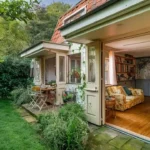Are you dreaming of your oasis amid a bustling city? Look no further than garden apartments! These charming living spaces offer a unique blend of nature and urban living. In this article, we will explore what exactly garden apartments are and how you can find one to call your own.
Table of Contents
What are Garden Apartments?
Living in a garden apartment comes with numerous advantages that make it an attractive housing option for many people. One of the primary benefits is the peaceful and serene environment that these apartments offer. Surrounded by lush greenery, garden apartments provide a sense of tranquility that is hard to find in the concrete jungle of the city.
In addition to the calming ambiance, garden apartments often come with private gardens, patios, or balconies. These outdoor spaces allow residents to enjoy the beauty of nature right at their doorstep. You can create your little sanctuary, complete with colorful flowers, potted plants, and comfortable outdoor furniture. It’s the perfect spot to relax, entertain, or indulge in a bit of gardening.
Furthermore, these apartments often provide residents with access to shared green spaces. These communal gardens offer a chance to connect with nature and build a sense of community. You can take leisurely walks, have picnics with neighbors, or even organize gardening clubs. The possibilities are endless when you have a shared garden space just steps away from your front door.
Features and amenities
These apartments are designed to integrate nature into everyday living. They often boast unique features and amenities that enhance the overall experience of residents. Some of the common features include large windows that allow ample natural light to flood the living spaces, open floor plans that create a seamless connection between indoor and outdoor areas, and well-designed landscaping that adds to the overall aesthetics of the complex.
Additionally, these apartments may offer a range of amenities such as swimming pools, fitness centers, community gathering areas, and walking trails. These amenities further enhance the lifestyle of residents and provide opportunities for socializing and recreation.
When it comes to the actual apartment units, garden apartments typically offer a variety of layouts to suit different lifestyles and preferences. From cozy one-bedroom units to spacious three-bedroom apartments, there is something for everyone. The units are designed to maximize natural light and ventilation, with many featuring balconies or patios that provide a connection to the outdoors.
How to find them in your area
To find the perfect garden apartment, you need to know where to look. Start by researching online real estate platforms that specialize in showcasing garden apartments. These platforms allow you to filter your search based on location, price range, and other preferences. You can browse through listings, view photos, and even take virtual tours of the available units.
Another valuable resource in your search for a garden apartment is local real estate agents who have experience in dealing with this type of property. They can provide you with insights into the market, help you navigate the rental or buying process, and guide you toward the best options available in your desired area.
Additionally, it’s a good idea to visit neighborhoods known for their garden apartments and explore the area for potential rental or purchase options. Take a stroll through the streets, visit local cafes or parks, and get a feel for the overall atmosphere of the neighborhood. You may stumble upon hidden gems that are not listed online or discover upcoming garden apartment complexes that are still in the pre-leasing phase.
Researching and comparing apartment
Once you have identified a few garden apartment complexes that catch your interest, it’s important to do thorough research and comparisons before making a decision. Start by gathering information about the reputation and track record of the property management company or landlord. Read online reviews, check their social media presence, and see if there have been any complaints or issues raised by current or previous residents.
Next, take a closer look at the amenities and services offered by each complex. Are they well-maintained? Do they align with your lifestyle and preferences? Consider factors such as the presence of a gym, swimming pool, parking facilities, laundry services, and security measures.
It’s also essential to consider the location of the garden apartment complex. Is it conveniently located near essential amenities like grocery stores, schools, and healthcare facilities? Is there easy access to public transportation or major highways? Think about your daily routine and how the location will impact your lifestyle.
Tips for renting these apartments
When it comes to renting a garden apartment, there are a few tips that can help you secure the perfect unit. First and foremost, start your search early. Garden apartments are often in high demand, so it’s important to give yourself enough time to find the right one. Start looking at least a couple of months before your desired move-in date.
It’s also crucial to have all your documents and paperwork in order. Landlords and property managers typically require proof of income, a credit check, and references from previous landlords. Gather these documents in advance to streamline the application process and increase your chances of being approved.
During the apartment viewing, pay close attention to the condition of the unit and any potential maintenance issues. Take note of any damages or repairs that need to be addressed before moving in. It’s also a good idea to ask about the pet policy, lease terms, and any additional fees or utilities that may not be included in the rent.
Questions to ask when visiting an apartment
When visiting a garden apartment, it’s important to ask relevant questions to get a clear understanding of the property and its suitability for your needs. Here are some questions to consider:
- Are pets allowed? If so, are there any breed or size restrictions?
- What is the lease term and are there any penalties for breaking the lease early?
- Are utilities included in the rent? If not, what can you expect to pay on average?
- Is there a designated parking space or additional parking options available?
- How is maintenance handled? Is there an on-site maintenance team or a designated contact person?
- Are there any restrictions on modifying the outdoor space, such as planting a garden or installing a grill?
By asking these questions and any others that are important to you, you can make an informed decision and ensure that the garden apartment meets your expectations.
Maintaining a garden apartment
Living in a garden apartment comes with the responsibility of maintaining both the indoor and outdoor spaces. Here are some tips to help you keep your garden apartment in top shape:
- Regularly water and tend to your plants and garden to keep them healthy and vibrant.
- Clean and sweep your outdoor space regularly to remove debris and maintain its aesthetics.
- Keep an eye out for any potential pest issues and take necessary measures to prevent or address them.
- Follow any maintenance guidelines provided by the property management for the overall upkeep of the garden area.
- Inside the apartment, keep the windows clean to maximize natural light, and regularly clean and dust any indoor plants.
By taking care of your garden apartment, you can continue to enjoy the beauty of nature and create a welcoming environment for yourself and your guests.
Pros and cons of living in a garden apartment
While living in a garden apartment offers many advantages, it’s important to consider the pros and cons before making a decision. Here are some factors to keep in mind:
Pros: – Serene and peaceful environment – Access to private or shared outdoor spaces – Integration of nature into daily living – Opportunities for relaxation and gardening – Community building through shared green spaces – Unique features and amenities
Cons: – Limited availability in some areas – Potential for higher rent or purchase prices – Maintenance responsibilities for outdoor spaces – Potential for pests or wildlife encounters – Noise from neighboring units or outdoor activities – Specific pet policies or restrictions
By weighing these pros and cons against your personal preferences and lifestyle, you can determine whether a garden apartment is the right fit for you.
Conclusion
Garden apartments offer a unique living experience, harmoniously blending nature and urban living. With their peaceful surroundings, private gardens, and access to shared green spaces, garden apartments provide residents with a tranquil oasis amidst the hustle and bustle of the city.
To find the perfect garden apartment, start by researching online real estate platforms and consulting with local real estate agents. Take the time to compare different complexes, consider the amenities and services offered, and ask relevant questions during apartment visits. Once you’ve found your ideal garden apartment, remember to maintain both the indoor and outdoor spaces to continue enjoying the beauty of nature. So, if you’re ready to create your oasis in the heart of the city, start your search for a garden apartment today and embrace a lifestyle that seamlessly integrates nature into your everyday living.


